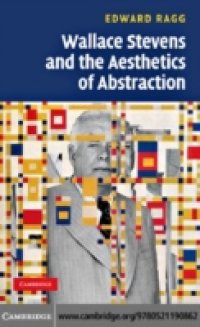Edward Ragg's study was the first to examine the role of abstraction throughout the work of Wallace Stevens. By tracing the poet's interest in abstraction from Harmonium through to his later works, Ragg argues that Stevens only fully appreciated and refined this interest within his later career. Ragg's detailed close-readings highlight the poet's absorption of late nineteenth century and early twentieth century painting, as well as the examples of philosophers and other poets' work. Wallace Stevens and the Aesthetics of Abstraction will appeal to those studying Stevens as well as anyone interested in the relations between poetry and painting. This valuable study embraces revealing philosophical and artistic perspectives, analyzing Stevens' place within and resistance to Modernist debates concerning literature, painting, representation and 'the imagination'.

